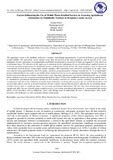Factors Influencing the Use of Mobile Phone-Enabled Services in Accessing Agricultural Information by Smallholder Farmers in Bungoma County, Kenya
Date
2023-11-15Author
Lusike, Mary
Wakhungu, Jacob
Ndiema, Alice
Okoth, Annette
Metadata
Show full item recordAbstract
The agriculture sector is the backbone of Kenya’s economy, contributing approximately 33 percent of Kenya’s gross domestic product (GDP). The agriculture sector employs more than 40 percent of the total population and 70 percent of the rural population. Kenya’s agriculture is predominantly smallholder farming and is carried out on farms averaging 0.2–3 ha, mostly on a subsistence basis. The objective of this study was to determine factors influencing the use of mobile phone-enabled services in accessing agricultural information by smallholder farmers in Bungoma County, Kenya. The study adopted a cross-sectional and correlational research design. Using simple random sampling, 400 respondents were selected to participate in the study. Data was collected using questionnaires, interview guides, and focus group discussions. Findings revealed that 71.1% of smallholder farmers indicated that it was costly to use mobile phone-enabled services to access agricultural information. Another 57% of the farmers perceived that socio-economic characteristics (age, education, and income) were factors determining the use of mobile phone-enabled services for accessing agricultural information. About 75.8% of the smallholder farmers did not use mobile phones to communicate agricultural information needed for their farming activities for various reasons, including: having no one to communicate with, due to the complexity of mobile phone technology, not being able to pay for the cost of both the purchase and use of mobile phones, and due to network problems. Further evidence showed that the factors affecting the use of mobile phone-enabled services have a significant impact on accessing agricultural information. The fact that socio-demographic factors significantly affect the use of mobile phone-enabled services in accessing agricultural information It is recommended that mobile phone service providers such as Safaricom, Airtel, and Orange need to understand the user’s characteristics, their needs, dynamics, and challenges, as well as potential changes in the future.
URI
https://doi.org/10.51867/ajernet.4.2.112https://ajernet.net/ojs/index.php/ajernet/article/view/171
http://ir-library.mmust.ac.ke:8080/xmlui/handle/123456789/2428
Collections
- Gold Collection [990]

